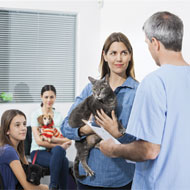RCVS updates guidance on informed consent

It is hoped that the updated guidance will help members of the profession to develop a more comprehensive approach to gaining consent.
The RCVS has updated its supporting guidance for veterinary surgeons and nurses, to provide further advice on discussing informed consent with clients.
Under the Codes of Professional Conduct, vets and nurses must communicate effectively with clients and ensure that informed consent is obtained and documented before treatments or procedures are carried out.
Changes to chapter 11 of the supporting guidance for the Codes were approved at the January meeting of the Standards Committee.
Nick Oldham, standards and advisory manager at the college, said he hoped the updated guidance will help members of the profession to develop a more comprehensive approach to gaining consent, reducing the risk of miscommunication and misunderstandings.
Explaining the changes, he said: “…We have updated our guidance to encourage veterinary surgeons to consider discussing a number of additional factors with a client before obtaining consent.
“This includes the nature, purpose and benefits of any treatment or procedures, the likely outcomes including potential risks, financial estimates, informing the client when other treatments may have available and checking that the client understands what they are agreeing to rather than assuming the client understands both the potential financial outlay and possible side effects.”
Additionally, there is new guidance for veterinary surgeons on who should seek consent. Typically this responsibility is expected to fall to the veterinary surgeon providing treatment or undertaking the procedure. However, Mr Oldham said the college recognises that this is not always practical.
“Therefore we clarify that the responsibility of obtaining consent can be delegated to another veterinary surgeon and, failing that, a registered veterinary nurse or student veterinary nurse could obtain consent provided that they are suitably trained, have sufficient knowledge of the proposed procedure or treatment and understand the risks involved.”
The standards and advice team is in the process of putting together a series of fictional case studies based on informed consent issues seen by the college’s preliminary investigation committee.
The updated supporting guidance can be found here: www.rcvs.org.uk/consent



 The Veterinary Medicines Directorate (VMD) is inviting applications from veterinary students to attend a one-week extramural studies (EMS) placement in July 2026.
The Veterinary Medicines Directorate (VMD) is inviting applications from veterinary students to attend a one-week extramural studies (EMS) placement in July 2026.